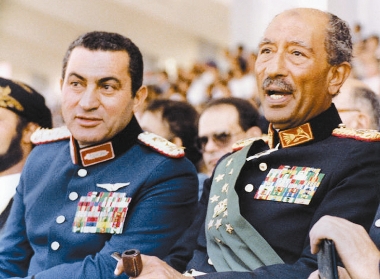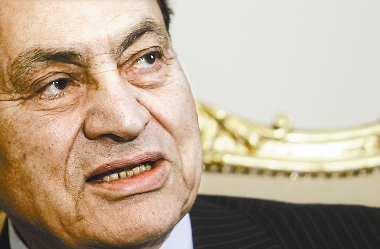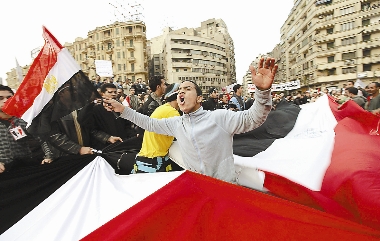

 THOUSANDS of workers went on strike Wednesday across Egypt, adding a new dimension to the uprising as public rage turned to the vast wealth President Hosni Mubarak’s family reportedly amassed while close to half the country struggled near the poverty line. Protests calling for Mubarak’s ouster have been spreading since Tuesday outside of Cairo’s Tahrir Square, where demonstrators have been concentrated for the past two weeks. Egyptians have been infuriated by newspaper reports that the Mubarak family has amassed billions, and perhaps tens of billions of dollars in wealth while, according to the World Bank, about 40 percent of the country’s 80 million people live below or near the poverty line of US$2 a day. The family’s true net worth is not known. The protesters filling streets of Cairo and other cities since Jan. 25 have already posed the greatest challenge to the president’s authoritarian rule since he came to power 30 years ago. They have wrought promises of sweeping concessions and reforms, a new Cabinet and a purge of the ruling party leadership, but Mubarak refuses their demands that he step down before September elections. Mubarak came into power after former Egyptian President Anwar Sadat was assassinated in 1981, and has come under criticism for extending the country’s Emergency Law since then. Under that “state of emergency,” the government has the right to imprison individuals for any period of time, and for virtually no reason, thus keeping them in prisons without trials for any period. Mubarak, in power for almost 30 years, has been Egypt’s great survivor. Few expected that the little-known vice president who was elevated to the presidency in the wake of Sadat’s assassination would hold on to the country’s top job for so long. Sadat was assassinated by Islamist militants at a military parade in Cairo and Mubarak was lucky to escape the shots as he sat next to him. Since then, he has survived at least six assassination attempts — the narrowest escape shortly after his arrival in the Ethiopian capital, Addis Ababa, in 1995 to attend an African summit, when his limousine came under attack. Besides his knack for dodging bullets, the former air force commander has also managed to keep a hold on power by positioning himself as a trusted Western ally and fighting off a powerful opposition movement at home. But with domestic unrest, his regional clout waning, his health failing, and his succession unclear, many questioned how long Mubarak would be able to carry on. Then, in a televised address Feb. 1, following mass protests in Cairo and other cities, Mubarak announced he had decided not to stand for re-election in September. Born in 1928 in a small village at Menofya province near Cairo, he insists on keeping his private life out of the public domain. Married to a half-British graduate of the American University in Cairo, Suzanne Mubarak, and with two sons, Gamal and Alaa, the Egyptian president is known to lead a strict life with a fixed daily schedule that starts at 6 a.m. Never a smoker or a drinker, he has built himself a reputation as a fit man who leads a healthy life. In his younger days, close associates often complained of the president’s schedule, which began with a workout in the gym or a game of squash. Mubarak was sworn in Oct. 14, 1981, eight days after the Sadat assassination. Despite having little popular appeal or international profile at the time, the burly military man has used his sponsorship of the issue behind Sadat’s killing — peace with Israel — to build up his reputation as an international statesman. In effect, Mubarak has ruled as a quasi-military leader since he took power. For his entire period in office, he has kept the country under emergency law, giving the state sweeping powers of arrest and curbing basic freedoms. The government argues the draconian regime has been necessary to combat Islamist terrorism, which has come in waves during the decades of Mubarak’s rule — often targeting Egypt’s lucrative tourism sector. In recent years, Mubarak has felt for the first time the pressure to encourage democracy, both from within Egypt, and from his most powerful ally, the United States. Mubarak has won three elections unopposed since 1981, but for his fourth contest in 2005 — after a firm push from the United States — he changed the system to allow rival candidates. Critics say the election was heavily weighted in favor of Mubarak and the National Democratic Party (NDP). They accuse the Egyptian leader of presiding over a sustained campaign of suppressing opposition groups, most notably the Muslim Brotherhood. The length of his tenure, along with his age and possible successors, had all been sensitive subjects in Egypt. People around Mubarak say his health and vigor belie his age — although a couple of recent health scares have been a reminder of his mortality. Rumors about the president’s health gathered pace when he traveled to Germany in March 2010 for gall bladder surgery. They flare every time he misses a key gathering or disappears from the media spotlight for any conspicuous length of time. The days of mass protests in Egyptian cities prompted Mubarak to finally name a vice president. On Jan. 29, intelligence chief Omar Suleiman was elevated to the role in what has been seen as an attempt by Mubarak to bolster his support in the military. Until then there had been no obvious successor but opposition groups had feared his son, 40-year-old former investment banker Gamal Mubarak, was being groomed for a kind of dynastic inheritance dressed up as a democratic transition. Is Gamal Mubarak still in the frame for the presidency? Gamal insisted he had no ambition to be president, but he had been moving steadily up the ranks of the NDP, becoming a leading advocate of economic and political reform. Historians point out that every president since the revolution of 1952 has come from the military, and Gamal’s civilian credentials may have given him trouble in gaining the support of that important constituency. With unrest in the streets and elections due at the end of the year, decisions will have to be made. (SD-Agencies) | 
